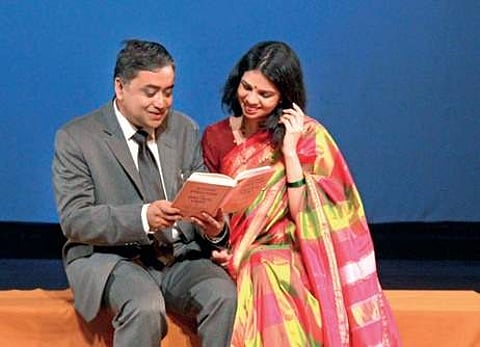

BENGALURU: Plays based on science themes are few and far between not just in India but around the world. Nilanjan Choudhury, an IT professional and a science enthusiast has ventured into writing and staging a play that explores one of the most tumultuous rivalries in science between late Nobel Laureate, S Chandrashekhar and English astrophysicist, Sir Arthur Stanley Eddington.
While numerous articles and books have been written on the subject, Nilanjan's play titled, 'The Square Root of a Sonnet (The Strange History of Black Holes)' is probably the first such attempt in play form. Since it was first staged at Rangashankara in September 2016, it has been seen by over 5000 people in various venues in the country. It will be being staged again in the city this weekend (see box)
"I stumbled upon the Chandrasekhar - Eddington debate on collapsing stars somewhere on the Internet. I was fascinated by the dramatic potential of the episode and the characters involved. I quickly got down to researching it. Luckily there was plenty of material to refer to. These helped me piece together a story that had conflict, characters and dramatic possibilities and yet was based on historical and scientific facts," says Nilanjan.
Besides the conflicts and struggles between the two scientists, this play goes into a fair amount of detail about advanced science topics like the theory of special and general relativity, quantum mechanics and their role in the formation of black holes. "To understand such things in their true sense would require a PhD degree and very advanced mathematics. But it is possible to give the audience an essence of through demonstrations, metaphors, visual aids and framing them in terms of more accessible everyday examples and story telling- which is what theatre enables very well," ads Nilanjan.
Nilanjan himself did his Masters in Physics from IIT Kanpur and intended on becoming a physicist. “Life had other plans and I ended up doing an MBA and went into the IT industry. However, I continue to pursue my interests in science through a wide variety of reading. This play is my foray into science communication through theatre,” he says.
Talking on the subject of ‘science theatre’ Nilanjan says he it is a recent phenomenon compared to the long history of theatre. As examples, he mentions plays such as Brecht’s Galileo, Tom Stoppard’s Arcadia, Michael Fray’s Copenhagen that were published between 1938 until the present day. “There arent too many such examples. Original Indian plays on science are also very rare - I can only think of Sundar Surukkai’s play on Ramanujan and Gautam Raja’s play The Invisible River (on anti-biotics) - both written by Bangaloreans,” he adds. Nilanjan is working on two other plays again based on scientific themes - The DNA of Desire about the revolution on genetics in 21st century and its convergence upon Victorian morality and laws. Another is the ‘Servant of God’ (working title) that explores the life of Pakistani physicist Abdus Salam who was the first Muslim Nobel Laureate.
Where and when
‘The Square Root of a Sonnet (The Strange History of Black Holes)’ will be staged at Jagriti, Whitefield on February 16 and 17 (8pm) and February 18 ( 3pm & 6.30pm)